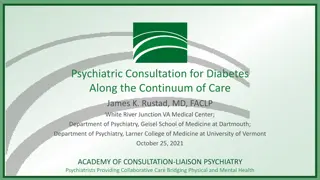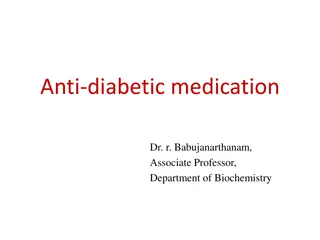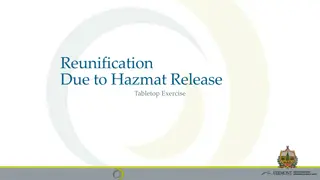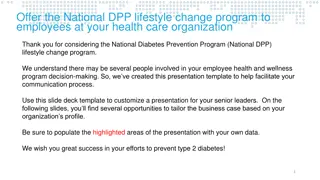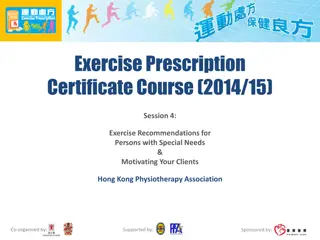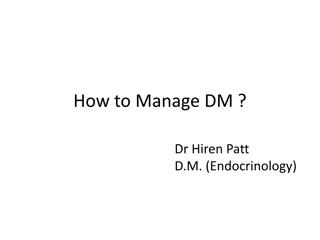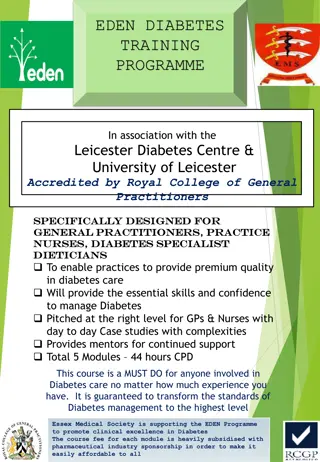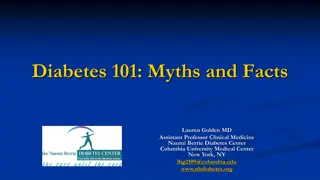Senior Wellness Presentation: Managing Diabetes Through Exercise
Explore the benefits of exercise in managing diabetes for seniors, including tips on starting an exercise routine and preventing health issues associated with diabetes. Discover how exercise can improve insulin sensitivity and overall well-being for individuals with Type 2 Diabetes. The presentation emphasizes the importance of proper meal planning, stress management, and medication adherence in diabetes management. Learn how exercise can aid in healthy aging and reduce the risk of complications related to diabetes. Handouts are provided to guide diabetic seniors in incorporating exercise into their daily routine.
Download Presentation

Please find below an Image/Link to download the presentation.
The content on the website is provided AS IS for your information and personal use only. It may not be sold, licensed, or shared on other websites without obtaining consent from the author. Download presentation by click this link. If you encounter any issues during the download, it is possible that the publisher has removed the file from their server.
E N D
Presentation Transcript
Thanks for Joining Us for a special Balanced Approach to Senior Wellness Presentation Todays Topics to include: The #1 doctor recommended thing you can do to control diabetes Tips for diabetic seniors who begin exercising Benefits of exercise for preventing diabetes Plus - Free Demo Fitness Class!
FAQs According to the Centers for Disease Control and Prevention (CDC) Approximately 26 million Americans have Type 2 Diabetes. That includes about 27 percent of Americans age 65 or older. Type II Diabetes, which constitutes about 90- 95% of all types of diabetes, is common in adults. It is caused by resistance to insulin, the hormone that absorbs sugar from your diet. The unabsorbed sugar causes the symptoms of diabetes and can lead to health issues such as heart disease, obesity and kidney failure.
Aging With Diabetes People with diabetes experience a faster type of aging than those without diabetes. This type of aging is commonly referred to as secondary aging (according to a review of exercise and aging in diabetes published in Vascular Magazine). Secondary aging mainly affects the blood vessels and can cause early heart disease and high blood pressure. Exercise encourages healthy aging with diabetes because it decreases insulin resistance.
Presenter: Please hand out the Why Exercise? handout. Exercise ENCOURAGES healthy aging with diabetes because it decreases insulin resistance Proper meal planning, stress management and taking medications as prescribed are all key factors in managing diabetes. However, The American Diabetes Association recommends exercise as particularly beneficial for both Type I and Type II Diabetes. Exercise actually improves insulin sensitivity and can improve a person s response to blood glucose medications.
For people who have diabetesor almost any other disease, for that matter the benefits of exercise can t be overstated. Exercise helps control weight, lower blood pressure, lower harmful LDL cholesterol and triglycerides, raise healthy HDL cholesterol, strengthen muscles and bones, reduce anxiety, and improve your general well-being. There are added benefits for people with diabetes: exercise lowers blood glucose levels and boosts your body s sensitivity to insulin, countering insulin resistance.
Presenter: Please hand out the Tips for Diabetic Seniors handout. Tips for Diabetic Seniors Who Begin Exercising: Discuss your exercise plan with your health care practitioner. Practice good foot care. This is especially important if you have circulatory problems or diminished sensation in your feet from nerve damage. Wear absorbent socks and shoes that fit well. Be sure to inspect your feet and promptly report any abnormalities to your doctor. Wear your medical alert tag and be sure to let your Trainer know you are diabetic. Monitor your blood sugar frequently if you are taking pills that release insulin from your pancreas. Drink plenty of fluids and always carry something with you to treat low-blood glucose. Adjust your diabetes medication or insulin dosage and food intake as recommended by your medical team.
In general, the best time to exercise is one to three hours after eating, when your blood sugar level is likely to be higher. If you use insulin, it s important to test your blood sugar before exercising. If the level before exercise is below 100 mg/dL, eating a piece of fruit or having a small snack will boost it and help you avoid hypoglycemia. Testing again 30 minutes later will show whether your blood sugar level is stable. It s also a good idea to check your blood sugar after any particularly grueling workout or activity. If you re taking insulin, your risk of developing hypoglycemia may be highest six to 12 hours after exercising. Experts also caution against exercising if your blood sugar is too high (over 250), because exercise can sometimes raise blood sugar even higher.
Presenter: Please hand out the Benefits of Exercise for Preventing Diabetes handout. How can exercise help those who are not diabetic or who are pre-diabetic? What are the PREVENTATIVE benefits of exercise?
The National Institutes of Health conducted a breakthrough study to show that diet and exercise can delay diabetes. The clinical trial proved that a half hour of walking or other low-intensity exercise daily, combined with a low-fat diet, reduced the risk of developing type 2 diabetes by 58 percent.
Healthy habits can definitely postpone the onset of diabetes even if they don t prevent it. Weight loss resulting from healthy eating and increased physical activity enables muscle cells to use insulin and glucose more efficiently, thus lowering diabetes risk. Lack of exercise can cause muscle cells to lose their sensitivity to insulin, which controls levels of sugar in the blood. Even if you don t lose weight, exercise will make you stronger and healthier, says endocrinologist Douglas Zlock, MD, medical director of the diabetes center at John Muir Health.
Successful exercise programs are those that last 10 weeks or longer. The goal is to make some form of physical activity a regular part of a daily routine.
Insert Logo Here We offer FREE senior fitness classes on Monday, Tuesday, Wednesday & Thursday @ 3:15 pm We hope you will join us and see for yourself how beneficial fitness is to your overall well-being!
Now its your turn Questions? Comments? Concerns?
Thank You for Attending Our Presentation! For more information, or to schedule senior fitness classes, or other educational opportunities in your Senior Living Community, please contact: Put your contact information here






